Relevant Overviews

The choices are so many that the decision to pick one (the optimal), becomes unmanageably hard. And even when a choice is made, second thoughts and doubts about whether it was the best, linger in the background, slowly consuming brain energy and peace of mind.
What makes a text nice to read? To know more about this, it is important to take a closer look at how people are reading. Additionally, it may be the case that someone is impaired, physically or mentally, to read a text. How does it work?
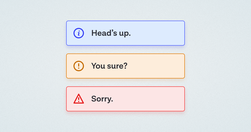
A while back, in the early days of our design system, we had a ticket for a component sitting in our backlog, with the title “Alert.” My initial reaction was “Oh yeah, a colored box with a little icon to the left of it and some text, easy.” Oh dear reader, how naive I was…

Users should not have to wonder whether different words, situations, or actions mean the same thing. Follow platform and industry conventions.
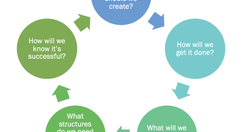
When organizations want to get more strategic about their content – when they want it to be more effective, more efficient, and advance their goals, they turn to content strategists. The core of what we do is to help the organization ask and answer key questions.
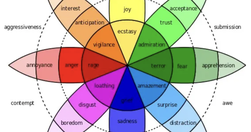
What separates great products from good ones? Attractive designs? User testing? Genius designers? Well, these might be contributory factors, but the true distinction lies in how they make users feel. Emotional design plays a huge role in the success of UX design.

Oral evidence is valid, and great histories have been told because of it. Memories are not true in the sense that they are not perfect depictions of the past. No, we cannot trust most interviewees.

The MVP awoke one morning from uneasy dreams and found itself transformed into a giant insect. It had devolved so far that it bore no resemblance to its former self. However, the fault was not in The Lean Startup but in a pervasive culture of overpromising and underdelivering.
Skilled UX designers and teams use tools such as empathy mapping to help them create products that keep the user or customer at the center of the design process, resulting in a product that resonates with users and provides a good user experience. But what is an empathy map, what are its uses, and how does empathy mapping fit into the process?
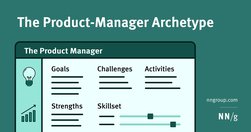
Product managers share common goals, strengths, activities, and skill sets. Awareness of these commonalities helps designers figure out how to best collaborate with product managers on Agile teams.

Our UX-maturity model has 6 stages that cover processes, design, research, leadership support, and longevity of UX. Use our quiz to get an idea of your organization’s UX maturity.
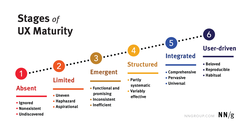
We'll ask questions about how your organization approaches UX. Based on your answers, we'll give you an estimate of your organization's UX maturity. This assessment is based on the Nielsen Norman Group UX Maturity Model. There are six stages in the UX maturity model.

The case for accessibility has to be about more than a legal and moral requirement. It has to persuade management that accessibility will generate a return on investment.
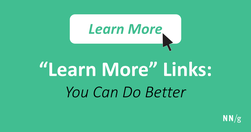
The phrase ‘Learn More’ is increasingly used as a crutch for link labels. But the text has poor information scent and is bad for accessibility. With a little effort, transform this filler copy into descriptive labels that help users confidently predict what the next page will be.

accessibility in journalism is important for everyone: Making news products more accessible, after all, often means making them more user-friendly and efficient. He hopes to discover and standardize ways of making the Post’s journalism accessible to as many people as possible.

Chat GPT to brainstorm ideas, write document outlines, compose tweets, make my emails friendlier, and much more. Recently, I even used it to suggest a possible information architecture based on the site content I provided.
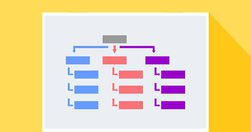
The number one most annoying feature of a website is improper or confusing navigation, leaving users lost and wondering what to do next. If you’re lucky enough, some users just might scour through the website to accomplish their purpose of visiting the website. However, most users simply pop-out and add more numbers to the website bounce rate...
Chat task; Write a 500 word article about user experience

Infinite scrolling minimizes interaction costs and increases user engagement, but it isn’t a good fit for every website. For some, pagination or a Load More button will be a better solution.

After all, we’ve changed dramatically as a news consuming public over the decades; think about how Twitter threads, TikTok videos, and interactive graphics have all burrowed their way into our news habits. Why shouldn’t our most basic story form change as well?

The Wizard of Oz is a type of user-research method that involves interaction with a mock interface controlled by a human. It is used to test costly concepts inexpensively and to narrow down the problem space.

The more choices a user has to make, the bigger the risk of getting into trouble. More features can easily reduce usability.

It's hard work to make a user interface that's easy to use. The end result may seem obvious to an outsider, but ease-of-use comes from trying out many design ideas and rejecting ones that are too difficult while polishing those that make the UI better.

Watching users' actual behavior helps us gain insights to improve the user experience.

You don't have to do all UX research yourself. You should learn from existing published work, which will save you much time, especially when beginning a new project.
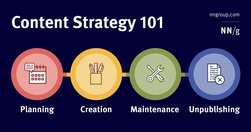
A content strategy is a high-level plan that guides the intentional creation and maintenance of information in a digital product.

Unsure where to start? Use this collection of links to our articles and videos to learn about visual design in UX.

A myriad of fields, skills and insights come together to create the overarching discipline of user experience design... Let’s explore five behavioral science insights you can use right now to design better products
Visitors are arriving at your website, but they’re leaving at an alarmingly high (and fast) rate. In a frenzy, you search through all your data and rummage through different digital metrics to try and find the culprit. While bounce rate seems to convey a simple message... Not everyone who bounces is a disappointed visitor.

Financial writing is full of jargon and complexity. But a series of research suggests that investors are drawn to simple, clear writing with short sentences. The simple reason is that complex writing is off-putting — people tune out and find it dull, a fact confirmed by neuroscience research.